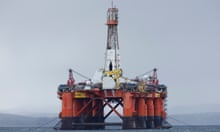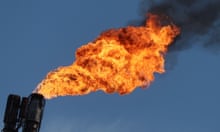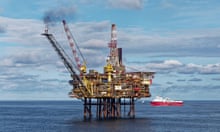The European Union is stoking its power plants with fewer lumps of coal and barrels of oil and gas than it has ever recorded, data shows.
The 27 member states burned 17% less fossil fuel to make electricity between January and June 2023 than over the same period the year before, a study from the clean energy thinktank Ember found. The EU made 410TWh of electricity from sources that release planet-heating gases, which analysts say is the lowest level since 2015 – the first year for which they have monthly data – and “very likely” since 2000.
The drop in fossil fuel generation was driven by a fall in demand for electricity, as well as some growth in clean power, the study found.
“We’re glad to see fossil fuels down, but in the long-term it is not going to be sustainable to rely on the fall in demand to do this,” said Matt Ewen, a data analyst at Ember and author of the report. “We have to be replacing this energy rather than just expecting it to go away and not be used.”
To try to stop the planet heating, the EU has promised to cut greenhouse gas pollution by at least 55% from 1990 levels by the end of the decade, and hit net zero emissions by 2050. To get there, it will probably have to use less energy but more electricity than it does today, as more people heat homes and drive cars with electricity instead of fossil fuels.
The report found that fossil generation in the first half of 2023 fell more than 20% in 11 EU countries and more than 30% in five of them. Fourteen countries saw their lowest total fossil generation on record for the period. In seven countries – Austria, the Czech Republic, Denmark, Finland, Italy, Poland and Slovenia – fossil fuel burning hit its lowest levels this century.
The findings back up analysis in June from the Centre for Research on Energy and Clean Air (CREA), a nonprofit research organisation, which showed “a clear shift away from fossil fuel-based power generation in the EU”.
But even as high energy prices have brought down demand, “the EU’s reliance on fossil fuels persists”, said Petras Katinas, an energy analyst at CREA and co-author of the report.
He said: “This dependence extends to external sources as well. Given that a significant portion of the EU’s fossil fuel needs are met through imports from third countries, a vulnerability exists. Even a minor disruption in the supply chain could lead to price hikes and potential energy shortages.”
The Ember report found growth in solar power continued in the first half of the year, making 13% more electricity than it did in the same period in 2022. Wind generation rose by 5%, while hydropower grew 11% after a shortfall from widespread drought last year. Nuclear generation fell 4%, but is set to climb during the year.
Several countries broke records for the share of their power that came from renewable sources of energy, the report found. Greece and Romania passed 50% for the first time and Denmark and Portugal broke 75%.
After Russia invaded Ukraine last year, gas prices shot up and the EU introduced emergency measures to cut demand. With winter also unexpectedly mild, demand for electricity fell 5% in the first half of 2023 compared with 2022.
after newsletter promotion
The Ember report found some of the drop in demand was down to changes such as using energy more efficiently, but much of the shift was “not sustainable or desirable”.
The report called on governments to build wind turbines and solar panels faster. It also said they should “urgently” expand the electricity grid, build more batteries to store electricity and streamline the process to get permits for clean energy infrastructure.
“We shouldn’t be complacent about the winter ahead,” said Ewen. “You need to keep pushing.”
This article was updated on 30 August 2023 to correct the EU’s emissions targets; they are a cut of 55% from 1990 levels by 2030 and net zero by 2050, not 65% by 2030 and net zero by 2045.









